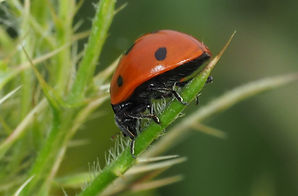What Do You Do? Managing pests in your yard
Our ecosystem depends on insects - we absolutely cannot live without them, and neither can the wildlife. Can you imagine a world without fireflies, dragonflies, or the “flying flowers” (butterflies), or without the serenades of katydids, cicadas, and crickets? Good cultural practices and planting the right plant in the right place will minimize pests (which often proliferate on stressed plants). However, large outbreaks of pests may occur if conditions are right. Here are a few pointers on managing pests sustainably.
-
Often infestations may be treated with nothing stronger than a jet of water to dislodge them. Physical removal is always appropriate and a first line of action. Insecticidal soaps are effective against soft-bodied insects. Also, learn to tolerate a certain amount of insect damage to leaves of your favorite plants. In fact, aphids on milkweeds are perfectly natural. But sometimes high levels of insect populations are an indication that plants are stressed, and cultivation practices may need improving. A diversity of plants in your garden will create a balanced environment that includes beneficial insects such as ladybugs that eat the insects you don’t want.
-
All but the most targeted use of insecticides defeats the purpose of using native plants to support butterflies, bees, and other wildlife.
-
Insecticides do not discriminate between beneficial insects and “target” insects such as mosquitoes. By killing a wide range of insects, they reduce the food source for the birds and frogs that eat mosquitoes, as well as directly kill other mosquito predators such as dragonflies. Click here for an excellent explanation.

Oleander aphids

Mosquito control
The practice of spraying yards for mosquitos is highly unfortunate. There are safer and more effective ways to control mosquitoes. Here an excellent explanation of why not to spray and what the safe alternatives are.
Butterfly numbers in the U.S. declined by 22% just in 2000-2020. The number one cause is insecticides.

The European Seven Spotted Lady Beetle
Neonicotinoids - the “systemic” pesticides
-
Systemic insecticides such as neonicotinoids are particularly problematic because they persist for months in the pollen, nectar, and other parts of the plant that are eaten by insects. While much safer for humans to apply, evidence is mounting that this class of poisons is problematic for many of our most important pollinators.
-
Neonicotinoids appear to be more persistent in some species of plants than in others, and much research remains to be done, but science suggests caution.
-
Plants you buy from many sources may have been treated with these systemic pesticides by the chain of growers supplying them; intensive greenhouse propagation methods can produce costly outbreaks of pests that may ruin a crop and a grower’s bottom line. Often nursery sellers or their salespeople don’t know what was applied at the seedling stage.
Tick control
It is wise when gardening to take protection against ticks by wearing long pants tucked into your socks. Permethrin-treated clothing is very effective at deterring both ticks and mosquitoes. Check for ticks when you come inside and pull off any that have become implanted.
You can reduce your exposure in your own yard by providing wide paths so you don't brush up against plants while walking.
Be aware that Japanese Barberries are known to increase the number of ticks.
-
To tell whether you are buying a chemical product for your use containing a systemic neonicotinoid pesticide, look for these chemicals in the ingredient list: acetamiprid, clothianidin, cyantraniliprole, dinotefuran, imidacloprid, sulfoxaflor, thiacloprid, thiamethoxam, nitenpyram. Their safety to pollinators is yet to be proved.
-
Note that systemic insecticides may sometimes be called for in treating trees whose pollen is wind-borne – for example, hemlocks heavily infested with wooly adelgid; exotic pests like this one often have no natural predators. These plants do not attract or affect pollinators (although of course they support a myriad of other important insects). Please always talk these decisions through with competent certified professionals and/or seek the advice of your Cooperative Extension service.
-
A pesticide may be organically derived (pyrethrum, spinosad, or neem, for example) – but it is still a poison, and it will still kill indiscriminately. ALWAYS READ THE LABEL AND FOLLOW INSTRUCTIONS, heed the printed cautions, with care.
-
The Rodale Institute has published a number of excellent materials on managing insect pests sustainably. Other resources include two excellent books by entomologist and horticulturist Dr. Jeff Gillman of the University of Minnesota, The Truth About Organic Gardening, and The Truth About Garden Remedies. More information about pollinator health and the concerns about neonicotinoids in particular is available from Wikipedia, and from the Xerces Society.
